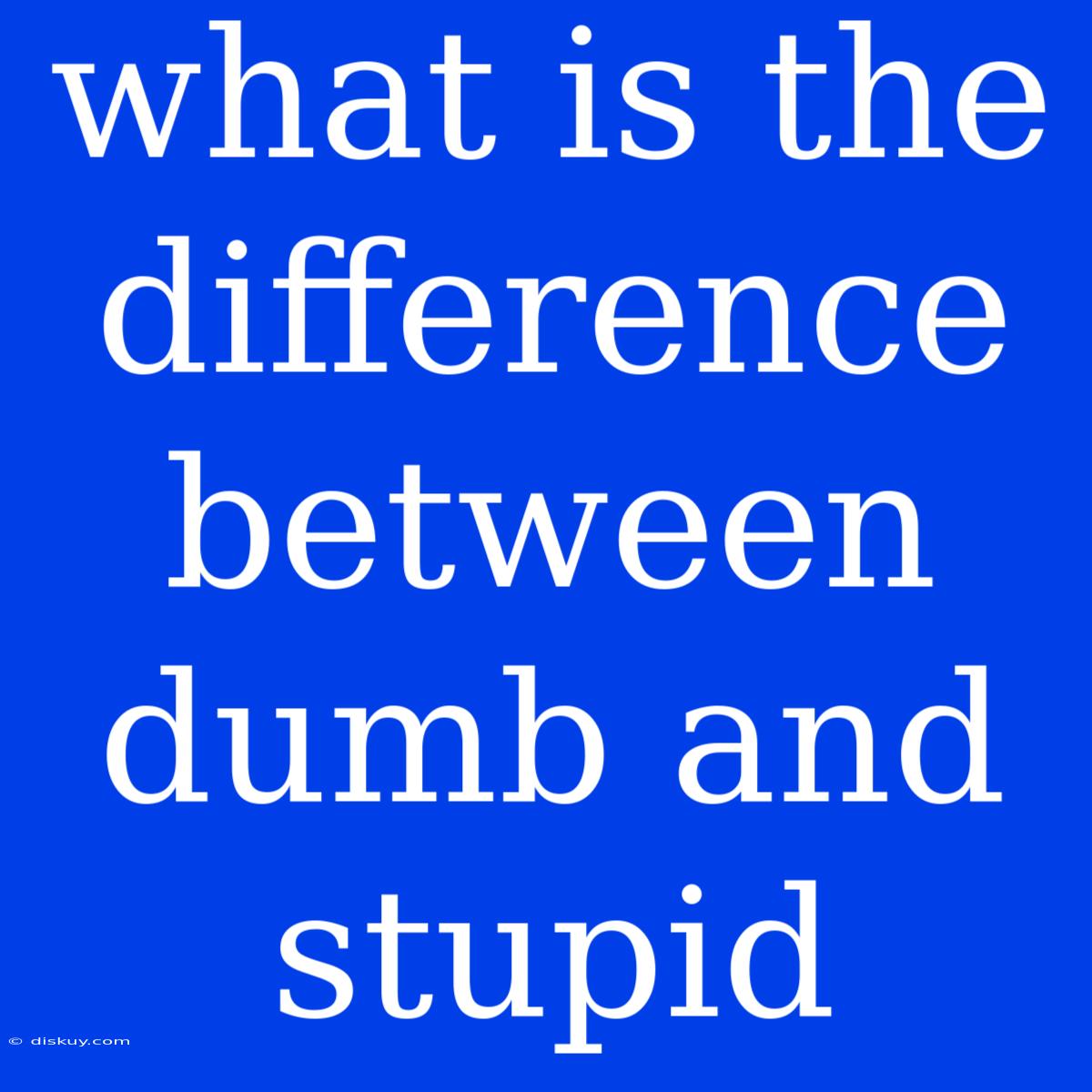What's the Difference Between Dumb and Stupid? Unraveling the Nuances of Cognitive Ability
Question: Are "dumb" and "stupid" truly interchangeable, or are there subtle but significant differences between these two terms?
Statement: While often used synonymously, the terms "dumb" and "stupid" carry distinct connotations, reflecting different aspects of cognitive ability.
Why This Matters: Understanding the nuances between these terms allows us to engage in more accurate and nuanced discussions about intellectual capabilities, fostering empathy and preventing harmful stereotypes.
Analysis: We explored various dictionaries, linguistic analyses, and psychological literature to delve into the semantic distinctions between "dumb" and "stupid." This research helped us develop a comprehensive guide to these terms, aiming to clarify their individual meanings and the contexts in which they are appropriately used.
Key Takeaways of Dumb and Stupid:
| Term | Definition | Connotation | Examples |
|---|---|---|---|
| Dumb | Lacking the ability to speak or communicate verbally | Inability to articulate or express oneself | A mute person may be described as "dumb." |
| Stupid | Lacking intelligence or common sense | Impaired reasoning and decision-making | Someone who makes a reckless decision might be labelled "stupid." |
Dumb vs. Stupid
Dumb
Introduction: "Dumb" primarily refers to the inability to speak, often associated with physical limitations or developmental conditions.
Key Aspects:
- Speech Impairment: This refers to the lack of verbal communication, not intellectual capacity.
- Historical Context: The term "dumb" historically referred to those with hearing impairments, who were unable to learn to speak.
- Modern Usage: Today, "dumb" is often used figuratively to describe someone who is silent or unresponsive, even if they are able to speak.
Discussion: While the term "dumb" is less common in modern usage, it remains important to understand its historical context and its distinct meaning. The term should not be used to imply a lack of intelligence or cognitive ability.
Stupid
Introduction: "Stupid" is a more general term that encompasses a lack of intelligence, common sense, or practical reasoning.
Key Aspects:
- Cognitive Deficiency: This involves impaired intellectual capacity, making it difficult to learn, solve problems, or make sound judgments.
- Lack of Common Sense: This refers to an inability to understand or apply basic knowledge and logic to everyday situations.
- Impulsive Behavior: People deemed "stupid" often engage in impulsive or reckless actions without considering consequences.
Discussion: "Stupid" is often used to describe someone who makes foolish decisions or acts in a way that seems illogical. It is important to remember that intelligence is a complex construct, and labeling someone as "stupid" can be inaccurate and hurtful.
FAQs about Dumb and Stupid
Introduction: This section addresses common questions and misconceptions surrounding the terms "dumb" and "stupid."
Questions:
- Are "dumb" and "stupid" always interchangeable? No, they have distinct meanings, with "dumb" primarily relating to speech and "stupid" reflecting a lack of intelligence or common sense.
- Is it ever okay to call someone "dumb" or "stupid"? It is generally considered offensive and disrespectful to use these terms.
- What are some alternative words for "dumb" and "stupid"? Instead of "dumb," consider "mute" or "non-verbal." For "stupid," options include "foolish," "unwise," or "naive."
- Can someone be "dumb" without being "stupid"? Yes, a person can have a speech impairment without being intellectually deficient.
- Is intelligence the only factor in determining "stupidity"? No, while intelligence is crucial, common sense and the ability to apply knowledge to real-world situations are also vital.
- How can I avoid using these terms in a negative way? Focus on describing the specific behavior or actions, rather than resorting to labels.
Summary: While "dumb" and "stupid" may seem interchangeable, they hold distinct meanings with important implications for understanding cognitive ability and promoting respectful communication.
Tips for Using These Terms Responsibly
Introduction: This section provides practical tips for using "dumb" and "stupid" in a respectful and accurate manner.
Tips:
- Avoid using these terms in everyday conversation. There are often more nuanced and appropriate words to convey your meaning.
- Be mindful of the historical context of "dumb." Use this term only when referring to speech impairment, not intellectual capacity.
- Focus on describing specific behaviors, rather than labeling someone. Instead of saying "You're stupid," try "That was a poor decision."
- Acknowledge the complexity of intelligence. Recognize that intelligence encompasses more than just academic performance.
- Promote empathy and understanding. Avoid using these terms in a way that could be hurtful or discriminatory.
Summary of Dumb and Stupid
This exploration has revealed that "dumb" and "stupid" are not interchangeable terms, despite their frequent use as synonyms. "Dumb" refers to the inability to speak, while "stupid" encompasses a lack of intelligence, common sense, or practical reasoning. Understanding these distinctions allows us to engage in more precise and respectful communication about cognitive abilities.
Closing Message: It's essential to navigate the intricacies of language, particularly when discussing sensitive topics like cognitive ability. By recognizing the nuances between terms like "dumb" and "stupid," we can foster a more compassionate and inclusive society.

